Featured Articles
The Fearsome Sonny Liston was a Man of Mystery

If physical presence and demeanor were the only factors that determine which boxer prevails inside the ring, Sonny Liston would have been undefeated.
It was said of Jack Dempsey that his opponents were already beaten before he stepped into the ring. The same could be said of Mike Tyson, tabbed “Kid Dynamite” by Sports Illustrated when he was only 15 fights into his pro career. Until he was knocked out by James “Buster” Douglas in February of 1990, no one really wanted any part of Tyson, knowing an early dispatch was likely.
Liston, hardly tall by heavyweight standards at 6-foot-1, was all that and more at the peak of his prowess.
Liston, who usually tipped the scale at 215 pounds, was a mass of raw musculature, especially across his broad shoulders and neck. Add to the equation Liston’s fists, which measured 14 inches, the biggest ever by a heavyweight, and then toss in an incredible 84-inch reach.
When Liston laid a glove on an opponent, he knew that he had been hit with raw power, or maybe a sledge hammer. “In the ring,” said Johnny Tocco, one of Liston’s early trainers, “Sonny was a killing machine.” But Liston’s scowl was equally intimidating and went a long way in helping the former Missouri State Penitentiary inmate finish with 50 victories in 54 fights and 39 knockouts over a 17-year professional career.
Sonny Liston was born in Sand Slough, Arkansas to a sharecropper, Tobey Liston, who fathered 25 children, the second youngest of whom was Charles, Sonny’s real name, born from Tobey’s marriage to Helen Baskin, a woman nearly three decades younger than he. But the year of Sonny’s birth, like the circumstances of his death, remain a mystery.
Many boxers come from impoverished backgrounds, but Liston’s was worse than most. “I had nothing when I was a kid but a lot of brothers and sisters, a helpless mother and a father who didn’t care about any of us,” he said. “We grew up with few clothes, no shoes, little to eat. My father worked me hard and whupped me hard.”
The many whippings that Tobey administered on him had a lasting effect. “The only thing my old man ever gave me was a beating,” said Liston, who claimed to be born in 1932.
Liston’s mother fled to St. Louis when Liston was about 13 years old and in time Sonny would follow her there. Schoolwork was difficult for him and because he couldn’t read or write, he was unable to find decent work.
Seeing a very limited future, Liston gravitated toward a world of crime that included muggings and armed robberies. He went to the well one too many times and in early 1950 was caught and sentenced to five years in the Missouri State Penitentiary. His stretch began in June of that year.
In prison, fate would intervene in the person of the penitentiary’s athletic director Alois Stevens, a Catholic priest, who told the young inmate that he should try boxing.
Liston took Father Stevens advice and showed real promise while sparring with Thurman Wilson, a professional heavyweight. The session lasted two rounds and Wilson was glad to leave the ring in one piece after the pounding Liston gave him.
Liston’s amateur career wasn’t very long, but was memorable. In March of 1953 he won the Chicago Golden Gloves Tournament of Champions with a win over Ed Sanders, the 1952 Olympic champion. Later that month, he outpointed Julius Griffin, the winner of the New York Golden Gloves Championship and captured the Intercity Golden Gloves title. In that encounter, Liston was knocked down in the opening round, but rallied to take the second and third rounds with Griffin holding on for dear life.
Liston also participated in the 1953 Amateur Athletic Union tourney and lost in the quarterfinals to Jimmy McCarter, who became one of Liston’s sparring partners. Liston then boxed in the International Golden Gloves Tournament at Kiel Auditorium in St. Louis, knocking out West Germany’s Hermann Schreibauer in the opening round in June. The previous month, Schreibauer had won the bronze medal at the European Championships.
With nothing more to prove, Liston turned pro. Because of his checkered past, few wanted to invest in him. Liston would get backers, but they would be men known to be mobsters.
Sonny made his pro debut in September 1953 with a first-round technical knockout over Don Smith at the St. Louis Arena. Six wins followed until Liston lost an eight-round split decision to journeyman Marty Marshall at the Motor City Arena in Detroit in September 1954.
This setback would prove to be an aberration as Liston would meet Marshall two more times. Liston earned a TKO win in the sixth round in April 1955 in Kiel Auditorium and a unanimous decision victory over 10 rounds in March 1956 at Pittsburgh Gardens.
In April 1959, Liston snatched a TKO win in the third round over Cleveland “Big Cat” Williams in Miami Beach and beat Williams again in March 1960 by TKO in the second round at the Sam Houston Coliseum in Texas. Liston then added five more wins to his ledger, including four early knockouts, to earn a date with Floyd Patterson, the reigning heavyweight champion.
On September 25, 1962 Liston took apart and then knocked out Patterson with a left hook to the jaw in the first round to begin his title reign.
Proud of his accomplishment, Liston was told by boxing writer and confidant Jack McKinney on the flight back to Philadelphia, his adopted home, that a warm reception would greet him. But when the plane landed and Liston looked for the adoring throng, there was none, save for some reporters and airline workers.
Larry Merchant, the longtime analyst for HBO Boxing, but then writing for the Philadelphia Daily News, penned this line: “A celebration for Philadelphia’s first heavyweight champ is now in order,” he wrote. “Emily Post would probably recommend a ticker-tape parade. For confetti we can use shredded warrants of arrest.”
Ten months later, Liston once again battered Patterson, knocking him down three times in the opening round at the Convention Center in Las Vegas, retaining his belt and adding the inaugural World Boxing Council bauble. But the title and its significance never really gained traction with boxing fans as Liston became the anti-hero.
Even President John F. Kennedy made it known that he was rooting for Patterson, in essence because he represented all that was good while Liston represented all that was bad. And the NAACP also shied away from Liston because of his shady past, saying at this time in America’s history Sonny was the last person it wanted to represent its people as king of the heavyweight division.
Columnist Jim Murray, writing in the Los Angeles Times, said of Liston, the ex-convict, “It was like waking up and finding a live bat on a string under your Christmas tree.”
Liston resigned himself to his fate, accepting the notion that he was the villain. “A boxing match is like a cowboy movie,” he said. “There’s got to be good guys and there’s got to be bad guys. And that’s what people pay for – to see the bad guys get beat.”
Liston’s next fight after demolishing Patterson in their rematch was a title defense against a 22-year-old named Cassius Clay, the “Louisville Lip,” who came into the bout in Miami Beach on February 25, 1964 as a 7-1 betting underdog despite a flawless 19-0 record. In what turned out to be a shocker for the ages, Clay, with a 78-inch reach, out-boxed, out-jabbed and out-fought Liston, who failed to answer the bell for the seventh round.
Fifteen months later, at St. Dominic’s Hall in Lewiston, Maine, in a clash that ended in the first round, Clay, who had changed his name to Muhammad Ali after winning the title, once again prevailed, but this time with a single shot. The knockout punch, a short chopping right to Liston’s head, was described by New York columnist Jimmy Cannon, as “not having enough power to squash a grape.”
Even ringsiders were without a clue as to what actually happened.
Many years later, in an interview with Mark Kram, the boxing writer for Sports Illustrated, Liston admitted to taking a fall. “That guy [Ali] was crazy,” he said. “I didn’t want anything to do with him. And the Muslims were coming up. Who needed that? So I went down. I wasn’t hit.”
Were those fights predetermined in Ali’s favor, or where they legitimate? More than a half century has passed since those two fights and there are as many questions as answers about them and about Liston, the man.
Following his second loss to Muhammad Ali, Liston soldiered on, winning 14 fights until meeting former sparring partner Leotis Martin in what would be his next-to-last fight at the Hilton International Hotel in Las Vegas in December 1969. Sonny was knocked out in the ninth round. Six months later, he stopped Chuck Wepner in the ninth round at the National Guard Armory in Jersey City, New Jersey.
In January of 1971, Liston was found dead by his wife Geraldine at his home in Las Vegas. Was he a victim of foul play? Shaun Assael, in his book “The Murder Of Sonny Liston: Las Vegas, Heroin And Heavyweights,” argues that Liston was murdered. All that is known for certain is that the coroner recorded his death as a drug overdose.
Novelist James Baldwin was sent to the Windy City by Nugget Magazine to cover the first Liston-Patterson tussle and knew very little about boxing, which probably helped him.
Upon meeting Liston, Baldwin wasn’t taken aback by his physical presence, his menacing stare or his lack of education.
“He is inarticulate in the way we all are when more has happened to us than we know how to express,” Baldwin wrote, “and inarticulate in a particularly Negro way – he has a long tale to tell which no one wants to hear.”
It seems that Baldwin, himself black, hit the proverbial nail on the head.
Check out more boxing news on video at The Boxing Channel
To comment on this story in The Fight Forum CLICK HERE
-

 Featured Articles3 weeks ago
Featured Articles3 weeks agoAvila Perspective, Chap. 330: Matchroom in New York plus the Latest on Canelo-Crawford
-

 Featured Articles2 weeks ago
Featured Articles2 weeks agoVito Mielnicki Jr Whitewashes Kamil Gardzielik Before the Home Folks in Newark
-

 Featured Articles4 weeks ago
Featured Articles4 weeks agoOpetaia and Nakatani Crush Overmatched Foes, Capping Off a Wild Boxing Weekend
-

 Featured Articles3 weeks ago
Featured Articles3 weeks agoCatching Up with Clay Moyle Who Talks About His Massive Collection of Boxing Books
-

 Featured Articles4 weeks ago
Featured Articles4 weeks agoFabio Wardley Comes from Behind to KO Justis Huni
-

 Featured Articles2 weeks ago
Featured Articles2 weeks agoMore Medals for Hawaii’s Patricio Family at the USA Boxing Summer Festival
-

 Featured Articles3 weeks ago
Featured Articles3 weeks agoThe Shafting of Blair “The Flair” Cobbs, a Familiar Thread in the Cruelest Sport
-

 Featured Articles3 weeks ago
Featured Articles3 weeks agoRichardson Hitchins Batters and Stops George Kambosos at Madison Square Garden






















